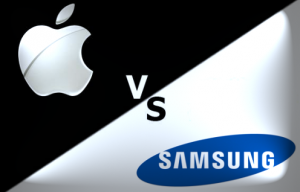The verdict in the complex case came after the nine-member jury began deliberations on Wednesday.
Apple Corp. filed its lawsuit in April 2011 and engaged legions of the country’s highest-paid patent lawyers to demand $2.5 billion from its top smartphone competitor. Samsung Electronics Co. fired back with its own lawsuit seeking $399 million.
During closing arguments, Apple attorney Harold McElhinny claimed Samsung was having a “crisis of design” after the 2007 launch of the iPhone, and executives with the South Korean company were determined to illegally cash in on the success of the revolutionary device.
Samsung’s lawyers countered that it was simply and legally giving consumers what they want: Smart phones with big screens. They said Samsung didn’t violate any of Apple’s patents and further alleged innovations claimed by Apple were actually created by other companies.
Samsung conceded that Apple makes great products but said it doesn’t have a monopoly on the design of rectangle phones with rounded corners that it claimed it created.
The trial came after each side filed a blizzard of legal motions and refused advisories by U.S. District Judge Lucy Koh to settle the dispute out of court.
Samsung has sold 22.7 million smartphones and tablets that Apple claimed uses its technology. McElhinny said those devices accounted for $8.16 billion in sales since June 2010.
Apple and Samsung combined account for more than half of global smartphone sales.
As part of its lawsuit, Apple also demanded that Samsung pull its most popular cellphones and computer tablets from the U.S. market.
From the beginning, legal experts and Wall Street analysts viewed Samsung as the underdog in the case. Apple’s headquarters is a mere 10 miles from the courthouse, and jurors were picked from the heart of Silicon Valley where Apple’s late founder Steve Jobs is a revered technological pioneer.
While the legal and technological issues were complex, patent expert Alexander I. Poltorak previously said the case would likely boil down to whether jurors believe Samsung’s products look and feel almost identical to Apple’s iPhone and iPad.
To overcome that challenge at trial, Samsung’s lawyers argued that many of Apple’s claims of innovation were either obvious concepts or ideas stolen from Sony Corp. and others. Experts called that line of argument a high-risk strategy because of Apple’s reputation as an innovator.
Apple’s lawyers argued there is almost no difference between Samsung products and those of Apple, and presented internal Samsung documents they said showed it copied Apple designs. Samsung lawyers insisted that several other companies and inventors had previously developed much of the Apple technology at issue.
The U.S. trial is just the latest skirmish between the two tech giants over product designs. Previous legal battles were fought in Australia, the United Kingdom and Germany.
The U.S. case is one of some 50 lawsuits among myriad telecommunications companies jockeying for position in the burgeoning $219 billion market for smartphones and computer tablets.
source: By PAUL ELIAS Associated Press

